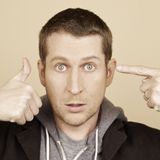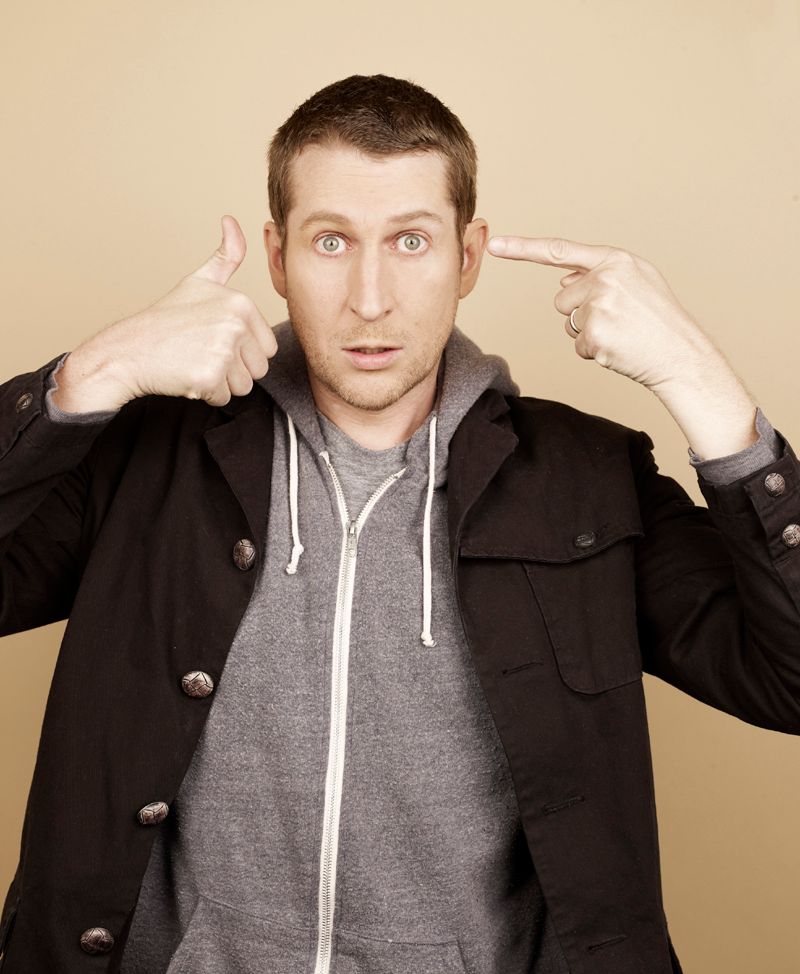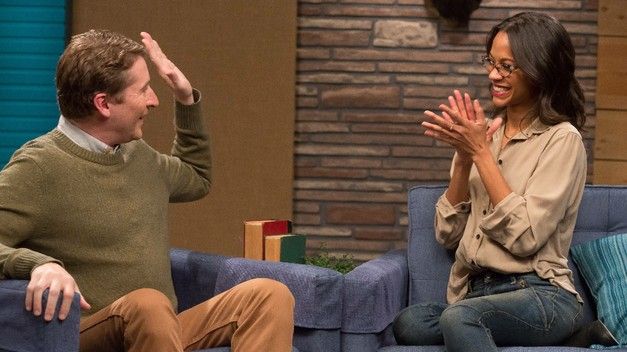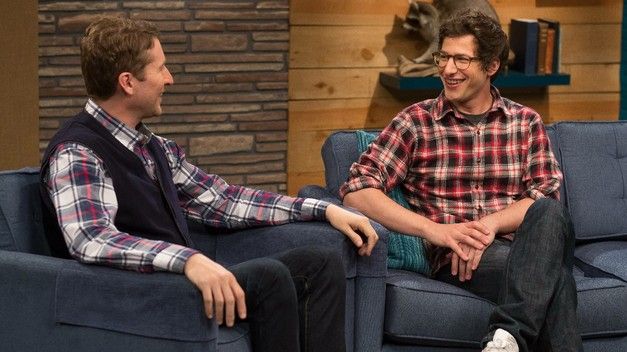It would be fair to say that Scott Aukerman is the connective tissue of comedy, bridging the gap between a legendary era in TV sketch show, the birth of viral comedy sites like Funny or Die and the podcast explosion.
A former writer on Mr. Show and the co-creator of Between Two Ferns, Aukerman is pulling double duty now as host of both the Comedy Bang Bang podcast and TV series, which airs Fridays at 10 p.m. ET/PT on IFC. His goal? Among others, to keep the shows “different” while still “seeming the same.”
Aukerman spoke with Spinoff Online about keeping the IFC show fresh in its second season, the state of sketch comedy and late-night television, and how podcasts may be better than sitcoms.
Spinoff Online: Can you tell me a little bit about the challenge of going from 10 episodes last season to 20 this season? Just as far as staying fresh.
Scott Aukerman: Well, the thing that was cool about it was, when you have 20 episodes -- I mean, that's so much material. At one point, we were just putting up cards of sketches that we had written or wanted to write and when I started organizing them into show orders it was like, "Oh, no, we need like 200 cards, at least,” which is so much material. But the cool part about it is, the first season we felt like we couldn't really experiment with the form that much. We were only doing 10 episodes and we needed to establish the template of what the show was. So really, the only one that plays with the format of it is the season finale, the "Green Screen" episode. When you have 20 episodes, all of a sudden you get more latitude to experiment and to do really cool things.
So for this season, we have some really cool big ideas coming up that we wouldn't have been able to achieve in Season 1, because it would be weird to do an episode, all of a sudden, where it’s a musical.
It's really cool to be able to stretch out and do some really interesting new things, because you're doing so much material that people like you keeping it fresh.
I mean, you can definitely see that there is more ambition and special effects on the screen, but still, I think a large part of the charm of Comedy Bang Bang is that we get to watch people go a bit further than they normally do. They're a part of the show and not just there to throw out a few canned anecdotes. How has that happened? How do you put people at ease so that they can make out with Reggie Watts in front of a green screen for a Tron spoof?
Well, no one is at ease doing that (laughs).
But the really cool thing about this here, is that everyone just kind of put themselves in our hands and said, "You know what? You guys are funny, I trust what you're doing, I like your show. I'll do whatever you ask me to do." We got a lot of that.
For instance, Cobie Smulders, who I’ve never met before; I’ve met her husband Taran (Killam). I don't have her email, she got booked by her manager or agent, something like that. There wasn't a lot of contact with her beforehand, but she sent my manager this really nice note saying, "Hey, I just want to let you know that whatever you want to do I'm fine with. Your show is great, you don't need to clear stuff with me, just whatever you want to do is great."
And that's the kind of trust that a lot of the talent had with us, which is just so cool. A lot of people that I’ve never met before, like Zoe Saldana or Jessica Alba, are kind of like "What am I in for?" but they just throw themselves into it with such abandon that it really ... the shows come out great because of that.
Now, the podcast interviews have a different energy than the ones on the show. Did you decide to go in a different direction when you went from the cast to the show because you didn't think that they would work well on TV or because they didn't fit into the overall theme of the show that you had in mind?
I don't know if they would work or wouldn't work, that's just not really the show that I wanted to do. And with the budget that we had, I knew we could do something more ambitious.
When they first came to me to do a talk show based on the podcast, I originally asked them -- I thought, "Wait, are you kind of thinking it's going to be a little more low-budget, almost like The Talking Dead, for instance?” You know? Like, do you think it's going to be a little like that or shot on one location and we have these conversations? And they were like, "No, no, we have a good budget for the show, we want it to be like a sketch show, almost.” That just really opened up my eyes to what was possible and I was happy about that. As good as the version of the show that has the aesthetic of The Talking Dead might be, where we just have long conversations, I love what we're doing.
I think it still retains the spirit of the podcast while still being something unique that isn’t just like, "You know what, I can watch the TV show or listen to the podcast -- either one is the same thing, there's no difference.” I like the fact that they're both different while still kind of seeming the same.
Do you think there's a place for long-form interviews on TV, more like what Kevin Pollak does on his podcast?
Like what Tom Snyder used to do?
Yeah, exactly. Like, I remember a few years ago, Craig Ferguson did an episode with Stephen Fry that was like that and people were like. “This is revolutionary.” It was amazing, but it’s not revolutionary. Do you think that that can still exist on TV, or has that gone the way of the dodo?
That actually is super-cheap, so you wonder why there isn't more of it, but you know I'm real interested in that kind of stuff. I always like when Letterman doesn't have just an actor and has a politician on and just asks serious questions. I like that kinda stuff. It's not necessarily what I wanted to do. You know, I only have a half-hour as opposed to an hour and 15 minutes, hour and a half sometimes. It's not really what I want to do with my show, but I think there could be a really good version of it out there.
What do you think put talk shows, for lack of a better term, in the crosshairs for you with Comedy Bang Bang and Between Two Ferns? Is it a loving send-up to a medium that you grew up adoring or are you just aghast at how seriously these shows take themselves sometimes?
Oh no, it's not even a send-up to me. You know, I grew up just loving the show of the ‘80s. So honestly, this is just my attempt to do it. I think it maybe comes off as a send-up because we don't have an audience, and a lot of our ideas in the first season were, sorta like, "Hey, what’s our version of what other shows are doing?” But honestly, I think that Comedy Bang Bang is like a companion piece to those early shows.
I actually heard that a whole bunch of early Letterman writers have been watching the show and were talking about it at a party my friend was at recently, saying like, "Oh, wow, this show is doing what we used to do.” That's the ultimate compliment to me, that those guys can see that, yeah, I'm just trying to do kinda weird comedy that pushes the boundaries of what you can do in a talk show format in the same way that Steve Allen, David Letterman and Conan before me used to do.
Do you think that kind of show is still on the air, with regard to the network late night offerings -- I know you mention Conan, that’s my Letterman of the ‘80s. That’s a show that I grew up watching. But I don’t really see ...
I don't think Conan necessarily does that stuff anymore. I don’t think that anyone is really doing that stuff anymore. You know, that's what the late-night landscape used to be about. When Letterman first came out, it was like “Oh, wow, we've never put anything at 12:30 on NBC, so let's put something weird on there.” Now it's big business. Talks shows and Late Night, now with Jimmy Fallon, it's real estate that they find very important and so it’s almost like they're too protective over it.
So, yeah, I don't think that a lot of shows are doing what we're doing and what those shows used to do, which is a shame, which is what I really wanted to do. So, I mean fans of that kind of stuff can watch our show. We’re just not on every night of the week, we’re on once a week so we try a little harder.
In my opinion, the sketch Golden Age, on television at least, begins with SNL in the late ‘80s with Hartman and Carvey and goes to the end of Mr. Show and Upright Citizens Brigade, and that covers The State, Kids in the Hall, etc. Would you agree, or am I high on paint fumes? Because I’ve had this argument with people before who say it’s SCTV, early SNL, or even now.
I think there's definitely stuff before the period you're talking about that's great on sketch -- Your Show of Shows. For SNL, yeah. As great as the early years were, as awesome as Eddie Murphy was, there's something about those years of 1988 through 1993 that's just magical. I think a lot of it had to do with the great writers that they had -- Smigel, Conan, Odenkirk, Jack Handey and everyone else. I mean, a lot of it is due to them and a lot of it is due to the amazing cast they had back then.
So for that, I mean yeah, there was so much great sketch on the air and you could actually sell a sketch show back then. I found, coming off of Mr. Show, no one really wanted to buy sketch shows anymore. Nowadays, Comedy Central will buy a sketch show if it's based around a personality like Dave Chapelle, Amy Schumer, or Key and Peele. And those shows are great, but there aren't a lot of the Monty Python type, just true sketch shows out there.
That's what's cool about IFC: They have Portlandia, they have my show, and they have The Birthday Boys coming up, and that's my favorite sketch group. I think it’s a shame that there aren’t more sketch shows on the air, and I think it’s a shame that networks keep flirting with doing them and then don't. I think we need to create more young comedy fans out there and comedy is bigger than ever right now, so it's weird that it's not necessarily reflected in sketch shows on TV.
Back in the ‘90s, there was the sitcom boom, and it seemed like that was the goal for every comedian. I'm not saying that’s not still a huge goal for people, but are podcasts now the new bar to reach for? Maron and WTF, and you obviously, is that the new standard? Do people just want to get a podcast at that level [of success] and have more creative freedom?
The great thing about podcasts is that you can do whatever you want, and so it's even better than having a sitcom, artistically, but there's nothing like that ‘90s sitcom money that’s out there with podcasts. (laughs)
I think comedians just want to express themselves. That's the great thing about podcasts and why so many people do them.
I mean, Paul Scheer has two TV shows on the air. Why does he have a podcast? Well, because he gets to do something that he doesn't get to do in his TV shows on the podcast. Why did I continue doing my podcast while I was doing 30 episodes of my TV show? It’s because there's something about the podcast that's really cool that I don't get to do anywhere else. So, I guess that's what I think is so great about them. But I also think that every comedian probably dreams of their own TV show and as long as TV is still a thing, that'll probably still exist.




